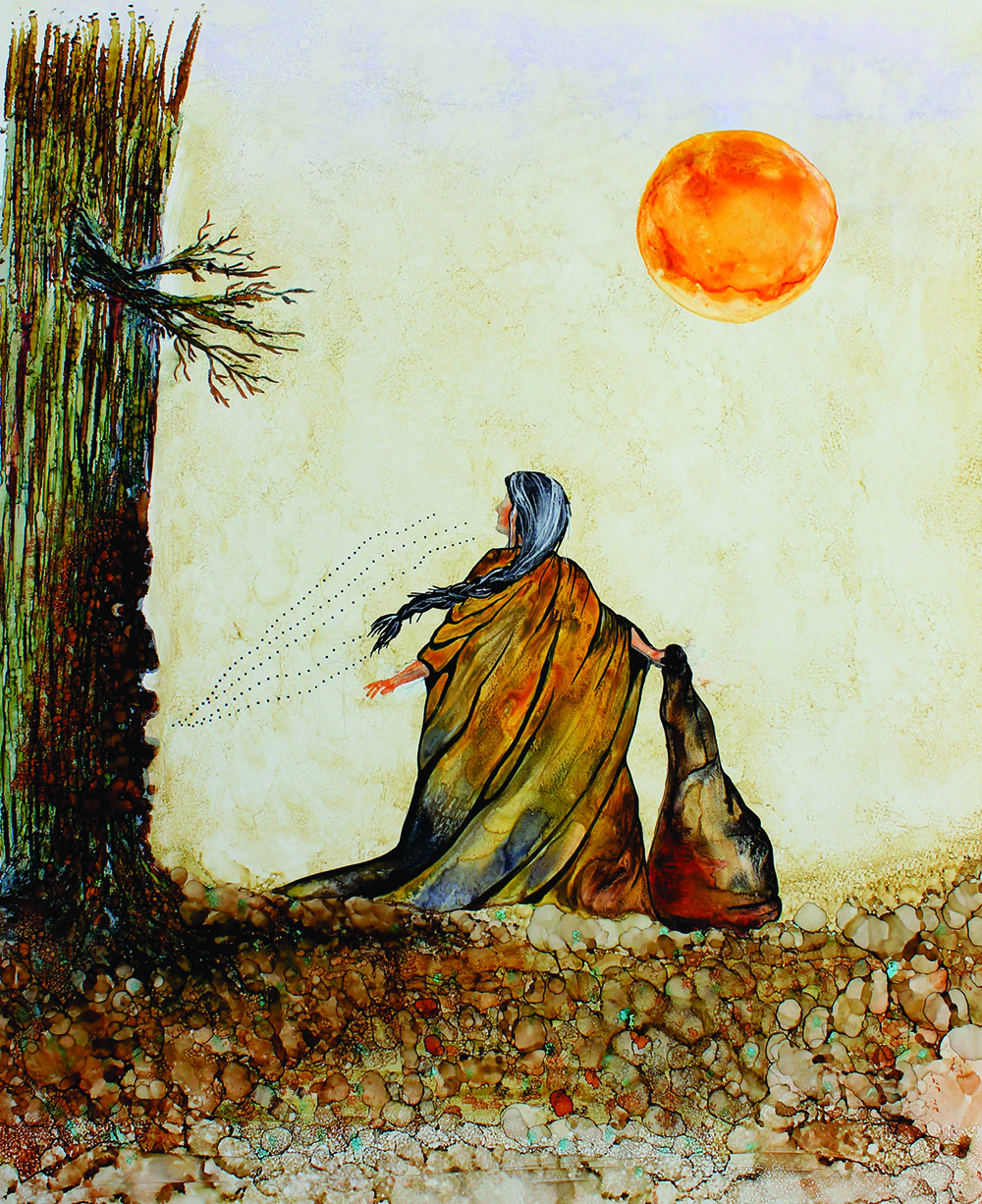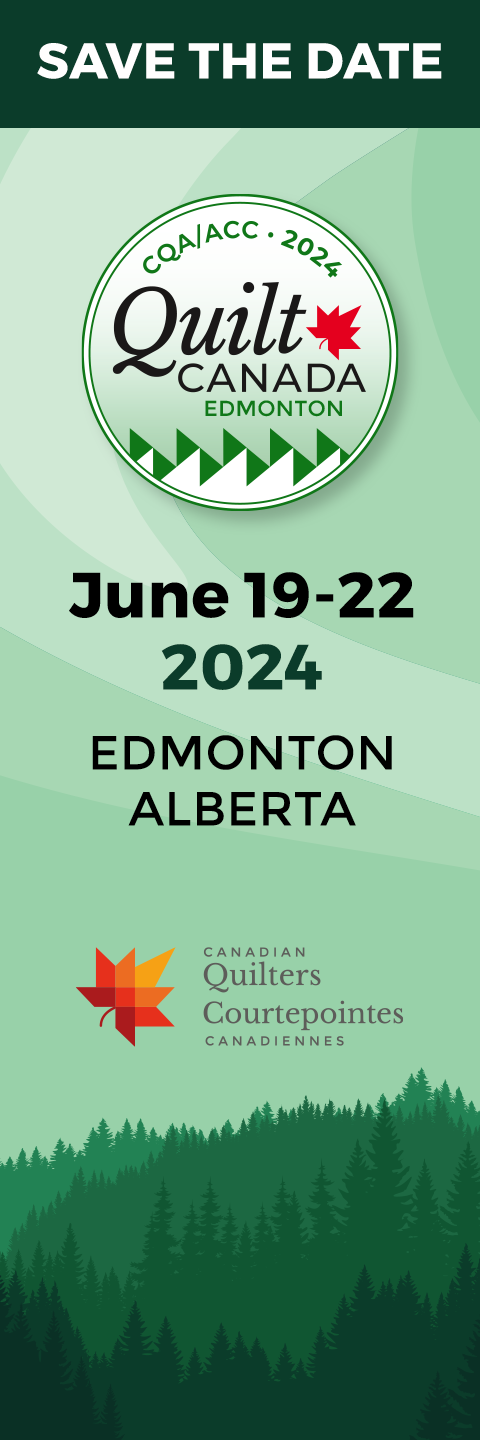I Love First Peoples supplies sewing labs in northern schools.
Sew & Sew is a program run by I Love First Peoples, a charitable organization focused on reconciliation that serves 90 northern communities. Schools in the far north are supplied with equipment and supplies to create sewing labs, which are accessible both to students and their communities. Deliveries were made to four schools in September, in time for the 2021-22 school year.
Top photo: The Story Tree by Colleen Gray: “A woman finds a blanket with stains of blood in the weave. She takes it to a Story Tree and places it there with her tobacco, and a request to know more. When she returns, the tree shares the story of the blanket with the woman under the midday sun.” Colleen raises funds to cover shipping costs, through the sale of her own artwork at artforaidshop.ca.
Colleen Gray describes her first visit to a school in northern Newfoundland as the seed that grew into the I Love First Peoples Sew & Sew program.
Colleen started Art for Aid, now a program of ILFP, about 10 years ago, to send art supplies to northern schools, using the sales of her own art to fund the shipping.
Almost three years ago, Colleen hooked up with Josée Lusignan from I Love First Peoples (ILFP), and that connection resulted in Colleen’s first opportunity to actually visit one of the schools she had been serving for so long. There, she was able to speak directly with the teachers and find out what it’s like to teach in a remote community. She wanted to know what they really needed, and most of all to ask: “What can I do?”. That’s where the idea of getting sewing machines came from. Colleen came home, reached out to her network, and asked for donations. The response was immediate. With the help of a Rotary Club that offered to cover shipping costs – the single most expensive part of supplying remote schools – three machines and 150 lbs of supplies were sent north.
Today, there are four schools benefiting from the Sew & Sew Program: two in Nunavut, and two in Newfoundland & Labrador. The supplies first arrived at the schools during the pandemic.
“These communities are heavily affected by the pandemic,” explains Josée. “All four of them were short staffed.”
“We know they received the equipment and started setting it up. We have contacts on the ground who are going to go visit the schools.”
But there are already signals that the sewing labs will have far-reaching effects on the communities. From Nain, NL, the furthest north community in Labrador, there was a request from an Inuit Life Skills group to bring facilitators from the region to use the school’s sewing lab for training, so those facilitators could then run workshops in their own communities.
“We know the labs are having impact beyond just the communities we’re serving,” says Josée.
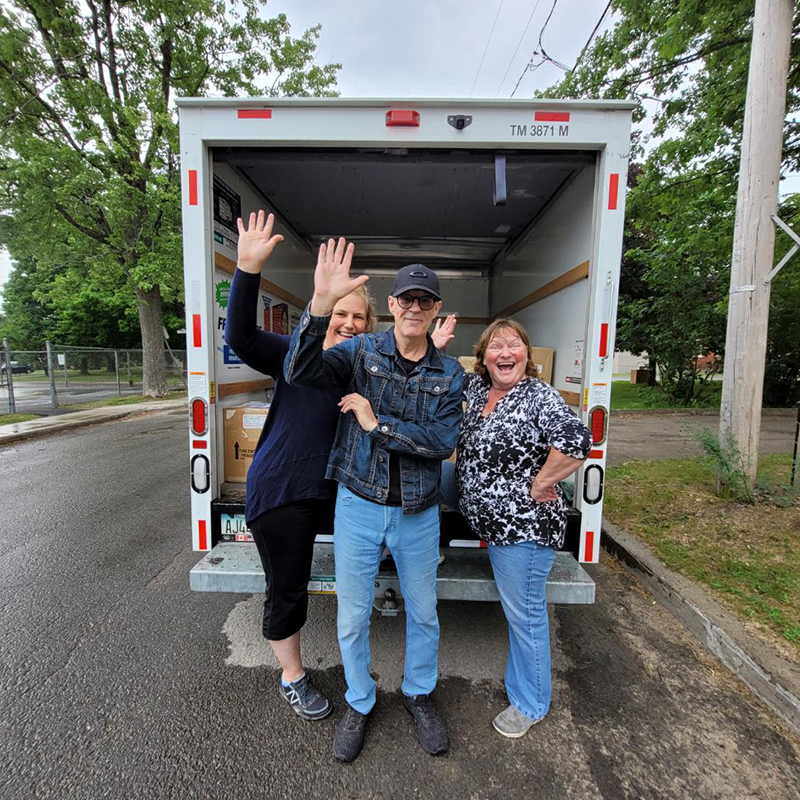
L-R Josée Lusignan (ILFP President), Ian Speirs (ILFP Director), Colleen Gray (Founder of Art For Aid)
Colleen tells the story of the former Principal at the Natuashish school, who was excited to revitalize the making of tea dolls (dolls stuffed with fragrant tea leaves) that are used to comfort children with the smells of home. Colleen is planning to send donated tea and sewing materials to the community.
“There are so many uses to this program,” says Josée. “Of course, initially the basic use is to teach the children and youth about sewing, but there are schools that are tying this to entrepreneurship.
“For instance, in Pond Inlet (on northern Baffin Island, Nunavut), they have had a successful sewing program for years. They sew parkas and mittens, but they’ve been doing everything by hand. They had three machines until two years ago, but they broke down, and since then everything’s been done exclusively by hand. So, this opens up a whole new world for them, to be able to teach kids to make parkas. And their goal is to sell these parkas, which are in very high demand.”
Of course, to make garments like parkas, or shelters from skins, you need a very sturdy machine. When Josée first approached Janome Canada about the need, they felt that a heavy duty machine that would sew through skins, and was also easy for beginners to use, would be most appropriate. So, the needs of the students as well as the greater community could be met.
In fact, Janome was so inspired by the project, that they committed to donating 60 of their 2030 QDC machines this year, to supply the first four schools, and 60 more machines each of the next two years, to supply future sewing labs. As Michael Smith of Janome explains: “Janome’s mission has been to bring the love of sewing to everyone by making fun, easy-to-use machines, and we were so inspired by the I Love First Peoples Sew & Sew Program, as it shares that same goal – sharing the love of sewing with new, budding sewists.”
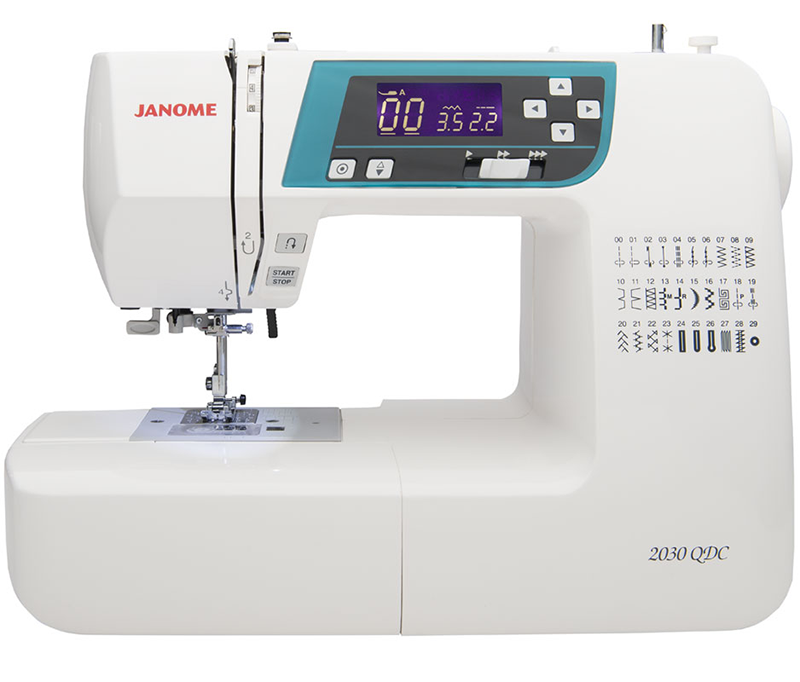
The 2030 QDC donated by Janome Canada for its ease of use for students, and its sturdiness for sewing skins and canvas.
“Sewing allows a person to think creatively, think outside the box. When problems or accidents happen, I call them ‘Creative Opportunities’ to troubleshoot and problem solve in order to make it work. This is very empowering, especially to a younger person, so sewing helps build their self-esteem.
“Sewing is a wonderful, enriching experience where you start with what may seem a random pile of supplies and through time, effort, and creativity, can be transformed into something tangible; something practical of use, or of beauty to admire, both of which have personal value.”
Janome also helps with the annual fabric drive that provides material and notions to the labs, by asking their dealers to become drop-off points for donations. Once the collections are made, Janome moves everything to their head office in Oakville, ON, where it is intended that volunteers sort through everything and pack it into boxes, which are put on skids and prepared for shipping to the north.
This past year, Michael explains, “because of COVID restrictions, we couldn’t have volunteers come in to help us, so it was just myself and Amanda, educator extraordinaire, who did all the sorting and packing.
“After sorting, all the boxes had to be numbered, labeled, and weighed as they were being loaded on the skids to be shipped, which, fortunately for Amanda and me, was handled by our warehouse staff.”
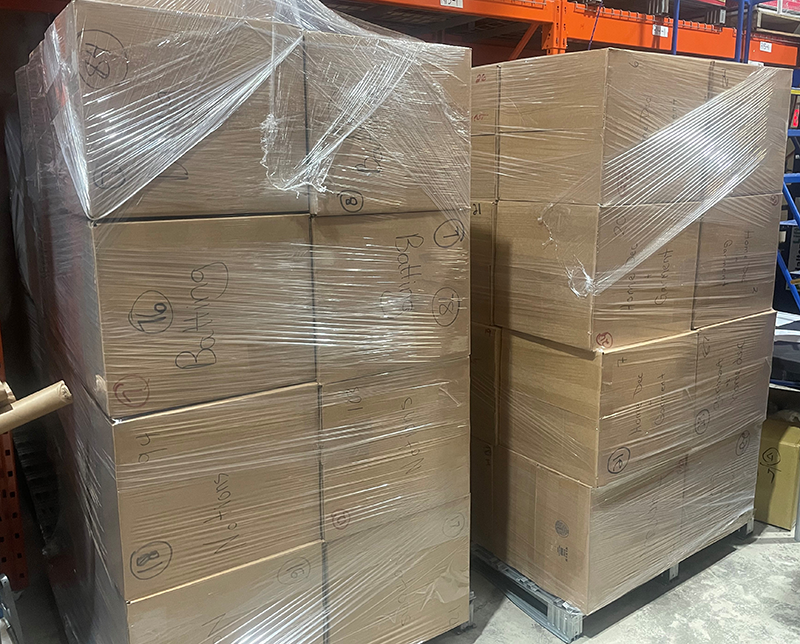
Fabric and notions donations from last year’s fabric drive were collected from Janome dealers by Michael Smith, National Consumer Education Manager, then sorted and packaged at Janome’s head office in Oakville, ON, before shipping to the north.
“Janome’s contribution cannot be understated,” says Colleen.
Josée adds: “Janome is such a fantastic partner. We have no words to express our thankfulness to them.”
The fabric collection is scheduled for this year from April 1 to May 31, 2022. It takes place at Janome dealers in the Toronto-Ottawa corridor only, perhaps as far as Montreal. Although the plan was to open up the drive Canada wide, the response last year was so overwhelming, even during the pandemic, that it will be focused in Ontario again this year.
Josée says that some donors prefer to donate physical goods. “But to ship the physical goods to the north, we need money. So, we have both (types of donations), and we really appreciate both.”
“That’s one of the reasons why more is not being done in the north, because shipping is so prohibitively expensive, and travel as well.”
It costs I Love First Peoples approximately $200,000 per year for transportation. For Colleen’s Art for Aid program, 65% of its cost is for shipping. She notes that a box of knitting wool, about 8 lbs, costs $60-70 to mail to the north. The cost of the last shipment of art supplies was $1400.
Josée explains that larger shipments are flown by cargo plane to hubs like Thunder Bay or Sioux Lookout, then must be transferred to the small passenger planes that can land in the more northern communities that are not accessible by road.
Sew & Sew Fabric Drive
April 1 to May 31, 2022
For a detailed list of items collected during the fabric drive, visit ilovefirstpeoples.ca/sewandsew.
Not in the Collection Area?
If you are unable, because of geography, to make donations to the fabric drive, keep in mind that ILFP needs cash donations to fund the transportation of sewing supplies to the north. Quilters are encouraged to raised funds through projects like charity quilts, then donate the
proceeds to the Sew & Sew program. To make a donation, visit ilovefirstpeoples.ca/donate.
For this reason, the shipping of finished quilts is prohibitive; they’re just too heavy. However, through another I Love First Peoples program that supports teen moms in the four schools that have sewing labs, quilters made baby quilts. The transportation of those quilts, along with other baby supplies, was covered by that program’s funding.
ILFP aims to support specific Sustainable Development Goals set by the United Nations Declaration on the Rights of Indigenous Peoples (UNDRIP): good health and well-being; quality education; reduced inequalities; and partnerships for the goals.
“ILFP supports youth through education; it’s very much about reconciliation and action,” says Josée. “Our whole mind set from the beginning is ‘how do we get reconciliation out of the political and academic spheres and into people’s living rooms?’
“This is why we put together these very simple and tangible projects that people can engage with and participate in directly,” she explains.
“From our point of view, when we create that opportunity, often times for most of our donors, it’s a first time engaging in an act of reconciliation, and our hope is that the donor will continue on that path, and learn more, engage more.”
“We, as Canadians, have so much to learn from the communities. We want to empower them. We want communities to be able to develop themselves, the youth to build a better future. But, at the same time, Canada would be so much more enriched if we have the opportunity to learn from these communities.”
I Love First Peoples will be represented at Quilt Canada in Vancouver this June, with the goal of education.
“Connecting with quilters is a new segment of our population that we have the opportunity to raise awareness with, about what life is like for youth in the north. If we are to advance reconciliation in this country, education is crucial.”
“The more we work together as Canadians,” Josée says, “the more we can expand this opportunity.”
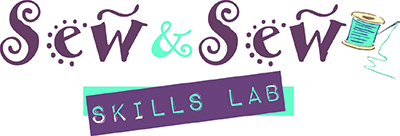
Need a speaker?
Josée Lusignan is the President and Founder of I Love First Peoples. She is available at no cost to do 25-30 minute Zoom presentations, followed by a Q&A, where she shares her experiences travelling the north.

